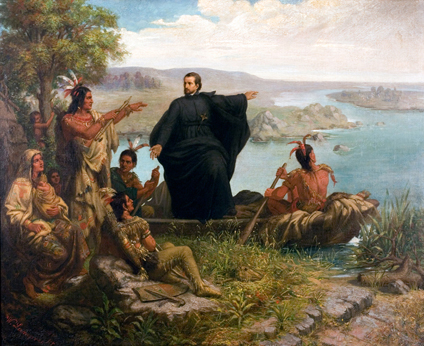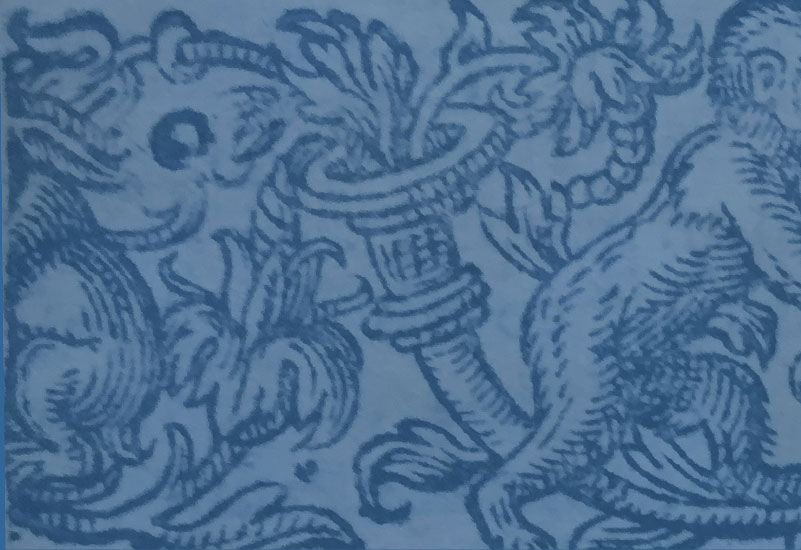Native America Collections
Please see Marquette University's Land and Water Acknowledgment
Why Marquette? | A-Z Index of Native America Collections
Post-Columbian collections encompassing Indians/ Indigenous peoples of North, South and Central America, the bulk of which pertain to the Catholic Church and Native American people in the United States since 1874.
Aspects of church work, e.g. Catholic evangelistic work, Catholic (social) action, Catholic social teaching, Christian sociology, pastoral ministry, theology, prevail throughout most holdings. Civil rights of indigenous peoples, economic justice, education, Christian inculturation in indigenous cultures, social reform, and government relations and accountability are widespread. Extensive audio visual, photographic, and textual holdings present indigenous and Christian beliefs, practices, music, and oral testimony/histories among several ethnic groups. A number of recordings and textual records feature indigenous languages, most of which are endangered, and many of which have translations. Most holdings pertain to urban and rural people in the United States and former dependencies, especially the Dakota-Lakota, Inuit-Yupik (Eskimo), Ojibwa-Ottawa (Odawa), Apache-Navajo (Dené), and Piman (Akimel O'odham-Tohono O'odham) Indian peoples. The records present the pioneering, spiritual, and social justice legacies of Saint Kateri Tekakwitha (Mohawk-Algonquin), Saint Katharine Drexel, Holy Nicholas Black Elk (Lakota), Père Jacques Marquette, S.J., Archbishop Charles J. Chaput, O.F.M. Cap. (Potawatomi), and other notables, as well as local history records by/about parishes, schools, communities, and racially mixed people.
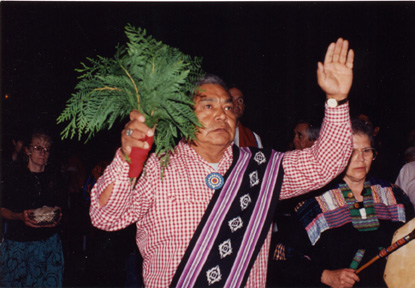 |
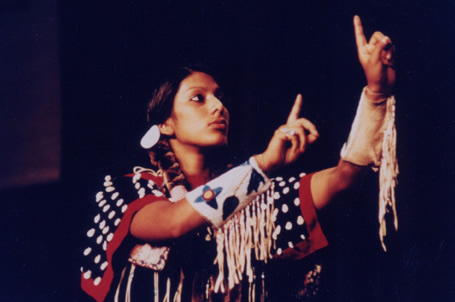 |
| A deacon processed before Mass at the Tekakwitha Conference, St. James Cathedral, Seattle, Washington, 1993. Tekakwitha Conference Records, Anne M. Scheurman, photographer. | Angel McFarland Sobotta (Nez Perce) signed the Lord's Prayer in Plains Indian Sign Language at the Tekakwitha Conference, Phoenix, Arizona, 1984. Tekakwitha Conference Records. |
FAQ
What services support research into the Native America collections? Marquette offers the following descriptive aids and reformatting options for enabling researchers to plan and develop their projects.
Descriptive Inventories: Detailed online descriptions of collections and the records within them are listed in the "A-Z Index of Native America Collections" linked above. The inventories are keyword searchable by using the search box in "Search the Collections."
Native American Writes: A listing of past writings about Native Americans researched using the Marquette collections. The arrangement is alphabetical by author and subdivided by general topics preceding tribal specific ones arranged A-Z by tribe. Biographical and historical topics are included.
African American Writes: A listing of past writings about African Americans researched using the Marquette collections, which is arranged alphabetically by author. Biographical and historical topics are included.
Guide to Catholic Records about Native Americans in the United States: Marquette’s Native Guide identifies record holdings not at Marquette (e.g. sacramental, school, photographic, administrative) and provides crucial background information on the hundreds of Native American tribes and groups, the churches, schools, special ministries, dioceses, and religious communities that served them. This background information is essential for navigating the Bureau of Catholic Indian Missions Records and other Native America collections. This selected list of Native Guide entries identifies several "Notable Native Churches, Schools, Special Ministries, and Organizations" documented in the Native America collections, which are potential topical areas for undergraduate student papers. The Native Guide includes step-by-step search procedures for using it as a collection searching tool in tandem with master lists of Native Groups and Catholic Groups represented in Native ministry anywhere in the U.S. that are potential keyword search terms under "Search the Collections." (See sidebar.) To track the whereabouts of individual Catholic priests and religious community groups stationed at various institutions, see CATHOLIC DIRECTORIES and ask an archivist regarding the off-line author index within the Bureau of Catholic Indian Missions Records Series 1 Correspondence.
Genealogy
Bureau of Catholic Indian Missions Records, Series 2-1 Surname Index: This index provides limited access to Marquette’s premiere record body with genealogical value -- the Native American school attendance records with over 25,000 surnames from 76 Catholic elementary and secondary schools in 15 states, 1890s-1977.
Do we have records about your family? For a record search and copies of records, please submit a Genealogical Query. Fees apply ($25/hour). Other genealogical resources include the Native Guide, digitized collections, school attendance and sacramental records in other collections, and off-line holdings of photography and school publications.
Digitized Collections: Includes The Indian Sentinel magazine, 1902-1962, and three collections of selected photographs under “Native America” plus "Catholic Ladder" Pictorial Catechisms under "In the Spotlight." The bulk of the Native America photography remains off-line, which is described within the respective descriptive inventories. The Historical Notes within the inventories to the Bureau of Catholic Indian Missions Records and the Tekakwitha Conference Records include pictorial histories.
Microfilmed Collections via Interlibrary Loan: Collections that are available on microfilm via interlibrary loan are noted within their respective descriptive inventories that include links to the Marquette Libraries’ guidelines for Interlibrary Loans.
Custom Scanning: See “Photo and AV Requests” and “Ask an Archivist” for more information.
How many past and present U.S. Catholic churches and schools have served Native Americans? How many are documented in Marquette’s collections? In compiling Marquette’s Guide to Catholic Records about Native Americans in the United States, Marquette archivists identified over 1,700 chapels, churches, missions, visitas, and schools that have served Native Americans within the present-day United States, of which over 1,200 are documented in its collections.
How many of the schools were boarding schools? Over 100 of the Catholic schools had boarding facilities. However, what constitutes a “Native American" boarding school? Several Catholic schools served both boarding and non-boarding students and Native and non-Native students in shifting proportions as well as the Native identities of some students have been questioned as well.
What Native American tribes, bands, and groups have been involved with Catholic organizations across the United States? Hundreds of Native groups have been so-involved. See the Native Groups list in the Native Guide.
What Catholic dioceses and allied religious organizations have been involved with Native American groups across the United States? Thousands of Catholic groups have been so-involved. For the dioceses and allied organizations, see the Catholic Groups list in the Native Guide. Catholic parishes, missions, and schools, past and present, are detailed in the guide entries to the current dioceses, parishes, and allied Catholic organizations, as well as the Bureau of Catholic Indian Missions Records and other Native America collections.
Who were Marquette's first alumni of color? Because the early Marquette University student records lack personal details, researching students' ethnicity requires outside sources and knowledge of university history. In 1907, the Milwaukee Medical College (now Medical College of Wisconsin) became the Marquette Medical School, and in 1908, the Milwaukee Law College became the Marquette Law School with alumni of both institutions declared Marquette alumni retroactively. In 1904, Josiah A. Powless (1871-1918) of the Oneida Nation (Wisconsin) graduated from the Milwaukee Medical College. Two African Americans, Horace S. Scurry (1865-1943) and Eugene Scott, attended the Milwaukee Law College before 1908 and 1911-1914 respectively, but they did not graduate. In 1926, Mabel Watson Raimey (1898-1986), also an African American, completed the Marquette Law School Evening Program and was recognized as an alumna.
Saint Kateri Tekakwitha: The Native America collections contain many photographs, writings, and recordings about St. Kateri and her Native American followers, a number of which appear in the book, Native Footsteps along the Path of Saint Kateri Tekakwitha (Marquette University Press with the Bureau of Catholic Indian Missions, 2012), and the video, The Legacy of Saint Kateri Tekakwitha (2013). To learn more about the collections, use keywords "Kateri" or "Tekakwitha" in "Search the Collections" and "Digital Collections". For further information, click "Ask an Archivist" and see the St. Kateri Tekakwitha resource list for K-12 educators.
Nicholas Black Elk: One native sainthood candidate whose life is perhaps the best documented is Nicholas William Black Elk, an Oglala Lakota healer and catechist from the Pine Ridge Indian Reservation in South Dakota whose life has inspired many to follow in his footsteps. This video, The Life and Holiness of Nicholas Black Elk, Our Brother in Jesus Christ (with illustrated text and credits and endnotes) and a handout, present a variety of resources from many collections and sources in the Marquette Archives and elsewhere.
When the Saints Go Marching In: A history of canonization with lessons learned from causes, past and present, with an emphasis on those pertaining to African and Native Americans (2015).
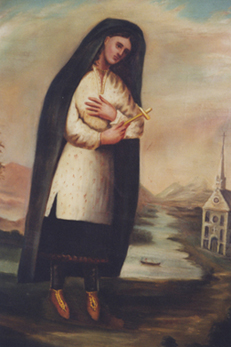 |
|
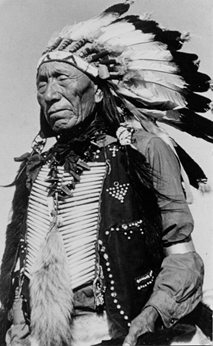 |
| St. Kateri Tekakwitha, Claude Chauchetiere, S.J., ca. 1685 | Father Marquette and the Indians," Wilhelm Lamprecht, 1869 | Nicholas Black Elk, W. Ben Hunt, 1937 |
Access and Services
Marquette welcomes public use of its collections. Service hours are by appointment only, Monday through Friday, 9:00 a.m. to 4:30 p.m. See Visiting Marquette Archives for more information. Photographic identification is required for access to the Raynor Library. Patrons should Ask an Archivist for guidance before their first use of Marquette materials and thereafter as needed.
ALL VISITORS AND RESEARCHERS ARE WELCOME

